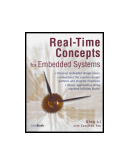Книга: Real-Time Concepts for Embedded Systems
7.7.1 Non-Interlocked, One-Way Data Communication
7.7.1 Non-Interlocked, One-Way Data Communication
One of the simplest scenarios for message-based communications requires a sending task (also called the message source), a message queue, and a receiving task (also called a message sink), as illustrated in Figure 7.6.

Figure 7.6: Non-interlocked, one-way data communication.
This type of communication is also called non-interlocked (or loosely coupled), one-way data communication. The activities of tSourceTask and tSinkTask are not synchronized. TSourceTask simply sends a message; it does not require acknowledgement from tSinkTask.
The pseudo code for this scenario is provided in Listing 7.1.
Listing 7.1: Pseudo code for non-interlocked, one-way data communication.
tSourceTask () {
:
Send message to message queue
:
}
tSinkTask () {
:
Receive message from message queue
:
}
If tSinkTask is set to a higher priority, it runs first until it blocks on an empty message queue. As soon as tSourceTask sends the message to the queue, tSinkTask receives the message and starts to execute again.
If tSinkTask is set to a lower priority, tSourceTask fills the message queue with messages. Eventually, tSourceTask can be made to block when sending a message to a full message queue. This action makes tSinkTask wake up and start taking messages out of the message queue.
ISRs typically use non-interlocked, one-way communication. A task such as tSinkTask runs and waits on the message queue. When the hardware triggers an ISR to run, the ISR puts one or more messages into the message queue. After the ISR completes running, tSinkTask gets an opportunity to run (if it’s the highest-priority task) and takes the messages out of the message queue.
Remember, when ISRs send messages to the message queue, they must do so in a non-blocking way. If the message queue becomes full, any additional messages that the ISR sends to the message queue are lost.
- Информация заголовочной страницы (Database header)
- Database dialect
- DATABASE CACHE SIZE
- Data sending and control session
- SCTP DATA chunk
- Integrated Secure Communications System
- Data Binding Using the GridView Control
- Interbase DataPump
- GetDataBack
- Работа с DataRow
- Anonymous UUCP
- 4 A few ways to use threads




